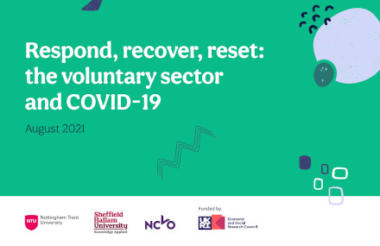Charities need to be able to invest in digital technology and skills to build on “dramatic” progress made during the pandemic, researchers say.
The latest Covid-19 Voluntary Sector Impact Barometer, compiled by NCVO Nottingham Trent University and Sheffield Hallam University, focuses on how charities used technology during the pandemic.
Just over two-fifths of survey respondents said they had changed how they used digital technology because of the pandemic.
The main barriers to further progress are a lack of funding and the skills level of existing users.
Nearly 350 people replied to the latest tracker survey and 45% said that having services available online made it easier for people to access them.
Four-in-five charities also used technology so that their staff and volunteers could work remotely, with just 41% of these organisations having used this technology before the pandemic.
Anya Martin, research and insight manager at NCVO, said: “We’ve seen charities respond creatively to the challenges. Most notably there was a huge uptake in the usage of digital technology – both for frontline service delivery and for back office uses. Many organisations used the crisis as a catalyst to develop better and more efficient services. The past year has been a challenge, but voluntary organisations have risen to it and gained valuable learning and expertise in the process.
“While progress still needs to be made, the data in this month’s report offers promising insights into charities potential future in the digital space, and the opportunities technology can offer for improving service accessibility beyond the pandemic.”
Barriers to further progress
Three-quarters of respondents said staff and volunteers now need more digital skills.
Indeed, 20% of respondents cited the skill level of current staff and volunteers as one of the main barriers to continuing to improve their use of technology.
Other barriers included: cost of equipment (17%), skills of service users (15%), service users’ access to equipment (14%), and lack of funding (12%).
Daniel King, professor of organisational behaviour at Nottingham Trent University and project lead, described the changes to the way charities use technology as “dramatic”.
He said: “The pandemic has shown some of the possibilities and limitations of digital working and service delivery, but investment is required to really capitalise on these changes if the sector is really able to build on the learning for the last 18 months.”
Increased demand of services
Elsewhere, the survey found that there is a mixed picture when it comes to charity finances.
Some 27% of respondents said that financially things had deteriorated, while 26% said they had improved.
After many coronavirus restrictions were lifted, 57% of respondents said they had seen an increase in demand for services. Just 9% reported a fall in demand.
Over the last month, 18% of respondents said that their paid workforce had increased, whereas 9% said it fell.
related articles











